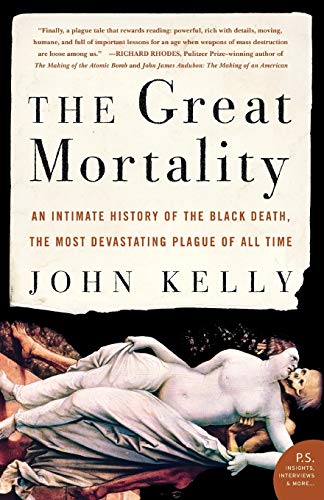Try Blinkist to get the key ideas from 7,500+ bestselling nonfiction titles and podcasts. Listen or read in just 15 minutes.
Start your free trial
Blink 3 of 8 - The 5 AM Club
by Robin Sharma

The Great Mortality by John Kelly is a gripping account of the Black Death, a devastating pandemic that swept through 14th century Europe, reshaping the social and political landscape and leaving a lasting impact on history.
In The Great Mortality by John Kelly, we are taken on a harrowing journey through the Black Death, one of the deadliest pandemics in human history. The book begins with the origins of the plague in the steppes of Central Asia, where it was carried by fleas on the backs of rats. The Mongol Empire, with its extensive trade routes, served as a conduit for the disease, spreading it to the Crimea and then to Europe.
Kelly vividly describes the initial outbreak in the Italian port city of Messina, where the disease arrived on a Genoese trading ship. The symptoms were horrifying: black boils, high fever, and swift death. The terror and confusion that gripped the city were just a prelude to the devastation that would soon sweep across the continent.
As the plague spread, Europe was plunged into a state of panic and despair. The disease was so contagious and deadly that people were dying faster than they could be buried. Entire communities were wiped out, and the survivors were left to grapple with the enormity of their loss. Kelly paints a vivid picture of the social and psychological impact of the Black Death, capturing the desperation and nihilism that permeated every aspect of life.
Amidst this chaos, people sought explanations for the plague's origins and cures for its ravages. Some blamed the Jews, leading to widespread persecution and massacres. Others turned to religion, engaging in extreme acts of penance and self-flagellation. Yet, despite these efforts, the plague continued its relentless march, sparing no one.
Despite the overwhelming odds, some individuals managed to survive the plague. Kelly explores the experiences of these survivors, detailing their strategies for avoiding infection and their attempts to rebuild their shattered lives. He also delves into the profound societal changes that the Black Death wrought, from labor shortages that empowered the peasantry to the erosion of feudalism and the rise of the middle class.
However, these changes were not without resistance. The ruling classes, desperate to maintain their power and privileges, imposed harsh laws to control wages and restrict the movement of laborers. This led to widespread social unrest and uprisings, as the lower classes rebelled against their oppressive conditions.
In the final sections of The Great Mortality, Kelly examines the long-term consequences of the Black Death. He argues that the pandemic was a pivotal event in human history, fundamentally altering the trajectory of European civilization. The plague's demographic impact, economic upheaval, and social transformations laid the groundwork for the Renaissance and the Enlightenment.
Despite its devastating toll, the Black Death also sparked scientific inquiry and medical advancements. The need to understand and combat the disease led to breakthroughs in fields such as anatomy, pathology, and epidemiology. In this way, the pandemic, while a catastrophe of unparalleled magnitude, also sowed the seeds of progress and enlightenment.
In conclusion, The Great Mortality by John Kelly is a gripping and comprehensive account of the Black Death and its profound impact on medieval Europe. Through meticulous research and vivid storytelling, Kelly brings to life the horror, resilience, and transformation that characterized this cataclysmic event. The book serves as a powerful reminder of the fragility of human existence and the resilience of the human spirit in the face of unimaginable adversity.



The Great Mortality by John Kelly is a compelling account of the Black Death, a devastating pandemic that swept through Europe in the 14th century, wiping out millions of people. Through meticulous research and vivid storytelling, Kelly explores the social, economic, and cultural impact of this catastrophic event, offering a fascinating glimpse into a dark chapter of history.
The Great Mortality (2006) by John Kelly explores the devastating impact of the Black Death in the 14th century. Here's why this book is worth reading:
It's highly addictive to get core insights on personally relevant topics without repetition or triviality. Added to that the apps ability to suggest kindred interests opens up a foundation of knowledge.
Great app. Good selection of book summaries you can read or listen to while commuting. Instead of scrolling through your social media news feed, this is a much better way to spend your spare time in my opinion.
Life changing. The concept of being able to grasp a book's main point in such a short time truly opens multiple opportunities to grow every area of your life at a faster rate.
Great app. Addicting. Perfect for wait times, morning coffee, evening before bed. Extremely well written, thorough, easy to use.
Try Blinkist to get the key ideas from 7,500+ bestselling nonfiction titles and podcasts. Listen or read in just 15 minutes.
Start your free trial
Blink 3 of 8 - The 5 AM Club
by Robin Sharma
What is the main message of The Great Mortality?
The main message of The Great Mortality is a historical account of the devastating impact of the Black Death.
How long does it take to read The Great Mortality?
The reading time for The Great Mortality varies depending on the reader. However, the Blinkist summary can be read in just 15 minutes.
Is The Great Mortality a good book? Is it worth reading?
The Great Mortality is a compelling read for history enthusiasts. It sheds light on one of the most significant pandemics in human history.
Who is the author of The Great Mortality?
The author of The Great Mortality is John Kelly.